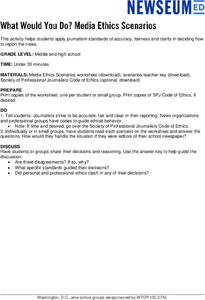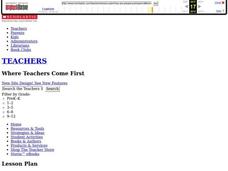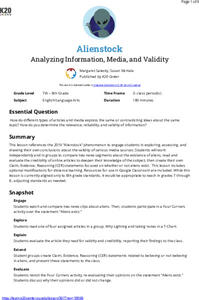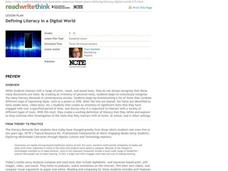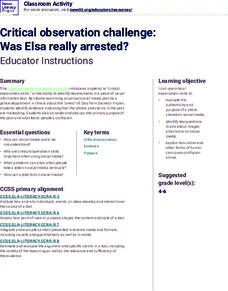University of the Desert
Do Journalists Shape or Report the News?
Analyze the presence of negative stereotypes and biased reporting in news media, and how this affects one's understanding of other cultures. Learners read newspaper excerpts and quotes from famous personalities to discuss the power of...
Newseum
What Would You Do? Media Ethics Scenarios
Young journalists are presented with scenarios that involve media ethics. They must decide in each case whether to cover the story, what they would cover, and if covered, what the angle would be.
Curated OER
How are People Portrayed by Different Media?
Your 9th - 12th graders can hone their analysis and critical thinking skills by studying the way a subject is portrayed across media types. They examine how various print, visual, and online sources have portrayed key players in the 9/11...
Museum of Tolerance
Developing Media Literacy
To protect young people from questionable content, many schools limit access. This resource suggests that because learners can so readily avail themselves to unrestricted Internet access, it is vital for 21st century learners to develop...
Newseum
Media Mix-Ups Through History: Analyzing Historical Sources
Scholars use the E.S.C.A.P.E. (Evidence Source, Context, Audience, Purpose, Execution) strategy to analyze a historical source to determine why mistakes happen in news stories. They then apply the same strategies to contemporary flawed...
Curated OER
Disability in the Media
Pupils look at websites about Down Syndrome and respond to how the media has impacted this disability on society. In this Down Syndrome lesson plan, students respond to different situations on worksheets.
Curated OER
Counteracting Media Stereotyping
Discuss media stereotypes with your emerging consumers. They view a television program to identify gender bias. After discussing the clip as a class, each learner writes a story showing more equitable roles. Or consider having them...
Facing History and Ourselves
#IfTheyGunnedMeDown
As part of their continued investigation of the reporting of the shooting of Michael Brown class members analyze photos of Michael Brown and the social media response to these images. The class then develops a guide they believe news...
Learning for Justice
Beauty is Skin Deep
If you are in need of a lesson on tolerance or the impact of media, this plan could be useful. The class begins with a brainstorming session in which they reflect on their own experiences with bias based on appearance. Next, they...
K20 LEARN
Alienstock: Analyzing Information, Media, And Validity
One only has to watch MSMBC and FOX News to realize that media can present the same story in very different ways. Middle schoolers have an opportunity to test their ability to determine the validity and trustworthiness of information by...
Social Media Toolbox
Social Media Plan
It's gameplan time! Journalism scholars create a social media plan based upon work completed in previous lessons. The activity, fifth in a 16-part Social Media Toolbox series, focuses on using data and consensus to create an effective...
ReadWriteThink
Defining Literacy in a Digital World
What skills are necessary to interact with different types of text? Twenty-first century learners live in a digital world and must develop a whole new set of skills to develop media literacy. Class members engage in a series of...
Newseum
The Fundamentals of News
A short video introduces middle schoolers to different media-related news terms. Viewers then complete a worksheet and discuss the differences between news and journalism, between facts and opinions.
EngageNY
Setting a Purpose for Research: Introduction to Media Literacy
What does that picture say? Young historians take a close look at a British advertisement from 1890 to determine the role of gender in advertising. They discuss the implications about women portrayed in the images. Pupils then further...
Facebook
Social Media and Sharing
Whether it's cute cat videos or pictures from an epic vacation, scholars love to check out what's happening on social media! But, how much sharing is too much? A lesson plan from a vast digital citizenship series poses some serious...
Curated OER
Cartoons for the Classroom: Satire or Slander
Encourage your young learners to analyze and think critically about how media portrays people or events. Upper graders analyze a political cartoon depicting President Obama as a Muslim and the First Lady as a revolutionary. Guided by...
Ontario
Lesson Plan for Media Literacy
Fourth graders analyze posters that communicate an "active living" message, otherwise known as a public service announcement. Children identify techniques that are used in creating media texts including topic, purpose, and...
Media Smarts
Defining Popular Culture
What part does media play in creating, defining, and perpetuating popular culture? High schoolers chart their encounters with fads, trends, and icons and reflect on the media's influence on popular culture.
The New York Times
Crossing the Line Online: Sexual Harassment and Violence in the Age of Social Media - NYTimes.com
Sexual harassment and sexual violence are by no means new issues. What has changed is the role of social media in these issues. This powerful and troubling lesson uses a specific rape case to launch research into a discussion of the...
Social Media Toolbox
Social Media Survey
Survey says ... social media is here to stay! How do the pupils in your school use social media? Using lesson four from a 16-part series, The Social Media Toolbox, learners study surveys and create their own. The resource includes...
News Literacy Project
Critical Observation Challenge: Was Elsa Really Arrested?
A 14-slide presentation showcases a social media post featuring Disney's Elsa from the movie, Frozen. The seemingly harmless post received lots of attention, raising the question, how do we know posts are factual? Scholars go through...
Media Education Lab
The Ethics of Propaganda
What are the short and long-term consequences for consumers and producers of modern media propaganda? Class members ponder this essential question as their unit study of ethics of propaganda concludes. After examining two case studies,...
iCivics
Propaganda: What’s the Message?
As class members progress through eight fully prepared learning stations, they will identify how bias is present in persuasive media, as well as differentiate among types of propaganda techniques like bandwagon propaganda and the use of...
Classroom Law Project
Should we believe everything we read? Becoming a discerning consumer of media
Class members investigate the role media should play in a healthy democracy. As part of this study, groups analyze political advertising, use FactCheck to assess not only the veracity of but the persuasions techniques used in candidates'...



